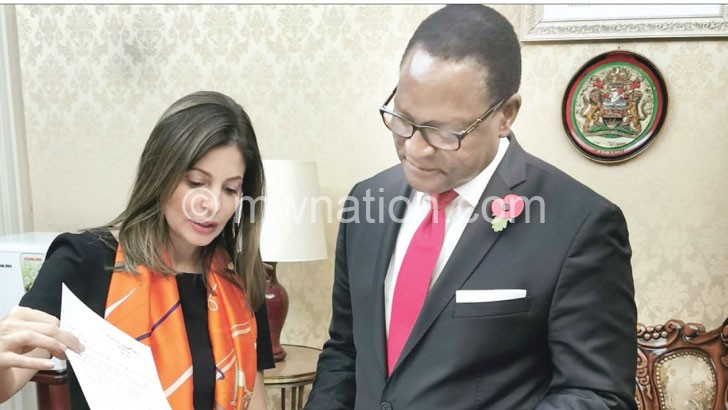Muslims warn Chakwera on Jerusalem choice
Muslim Association of Malawi (MAM) has warned President Lazarus Chakwera that his administration’s decision to open a diplomatic mission in Jerusalem puts the country at risk of deplorable consequences from some Arab nations.
The warning comes days after Palestine President Mahmoud Abbas sent a letter to Chakwera through a special envoy, raising concern over Malawi’s decision to open its mission in Jerusalem and not Tel Aviv.
But Gilbert Khadiagala, a Jan Smuts professor of international relations and director of the African Centre for the Study of the United States at the University of Witwatersrand in South Africa, on Tuesday downplayed the purported risks, saying not all Arab countries disagree with Israel.

Lilongwe two weeks ago
In an undated letter which MAM has owned up, the association expressed fear that Malawi may not only become a target for extremists, but that the country risks losing support from the Arab countries on the side of Palestine.
MAM said the stand of Palestine to sever relations with any country that opens an embassy in Jerusalem would have a negative impact on Malawi’s economy.
Reads the statement in part: “Some assistance that Malawi used to benefit from the machinery of most of the Islamic governments such as Kuwait Fund could be suspended. Consequently, Islamic charitable organisations that assist this country through Islamic organisations in the education and sanitation infrastructure for instance, will no longer be there.”
M A M r e q u e s t e d Chakwera to maintain the status quo in its longtime relationship with Israel by using Israel’s non-resident ambassador based in Nairobi, Kenya or in other countries closer.
In an interview, MAM spokesperson Sheikh Dinala Chabulika confirmed engaging the President through the letter.
Mzuzu Universi ty security studies expert Eugenio Njoloma said while MAM’s position could be religiously influenced, it had merit.
He said there is need for further engagement for Malawians to see if the benefits of opening an embassy in Jerusalem outweigh the risks.
Said Njoloma: “I think to say extremists would not target Malawi would be to underestimate international pol i t ics. Remember terrorists/extremists only seek to send messages and not to kill the target. This is why they did not target Clinton in US, but rather US embassies in Kenya and Tanzania.”
In a separate interview, former Malawi ambassador to Japan John Chikago asked the President to tread carefully, saying the essence of diplomacy is to build bridges and not break them.
He said diplomacy should be informed by international laws and history.
Said Chikago: “Modern diplomacy is a fluid business. In that regard, it must be based on serious national interests. During the Cold War, we depended on the west, but in the unipolar world, it is tricky. With President Joe Biden [in the US] international politics is bound to change.”
But in his written response, Khadiagala said he was not surprised with Chakwera’s decision because as a born-again Christian, he was more likely to use his authority to placate the Israelis.
He said there was no potential threat from extremists neither should Malawi worry about aid from Arab countries as it was insignificant compared to what the country benefits from America and Israel itself.
On potential threats, Khadiagala said: “I don’t
see any threats from Muslim extremist elements because of this move. Besides, three Arab governments recently recognised Israel and established diplomatic relations with it, so they are unlikely to punish countries with relations with Israel if they are doing so themselves.” see any threats from Muslim
Chakwera has insisted that Malawi will proceed with its plan to open a diplomatic mission in Jerusalem despite continued resistance and protests from Palestine.
When he appeared before Parliament in September to answer ques t ions from legislators, the President stressed that Malawi was a sovereign State free to establish diplomatic relationships with any country provided it is for the benefit of Malawian people.
There is an unresolved conflict between Israel and Palestine over East Jerusalem. Of 89 countries with diplomatic missions in Israel, only the United States of America and Guatemala are based in Jerusalem where about 13 others operate consulates and the rest are in Tel Aviv.
Since 2017, US President Donald Trump has been leading a campaign to have Jerusalem recognised as the capital of Israel.
But when the question was put at the UN General Assembly in December the same year, 128 countries voted against the US proposal, nine were in favour and 35 were absentees, including Malawi. Togo is the only African country to have supported the US





